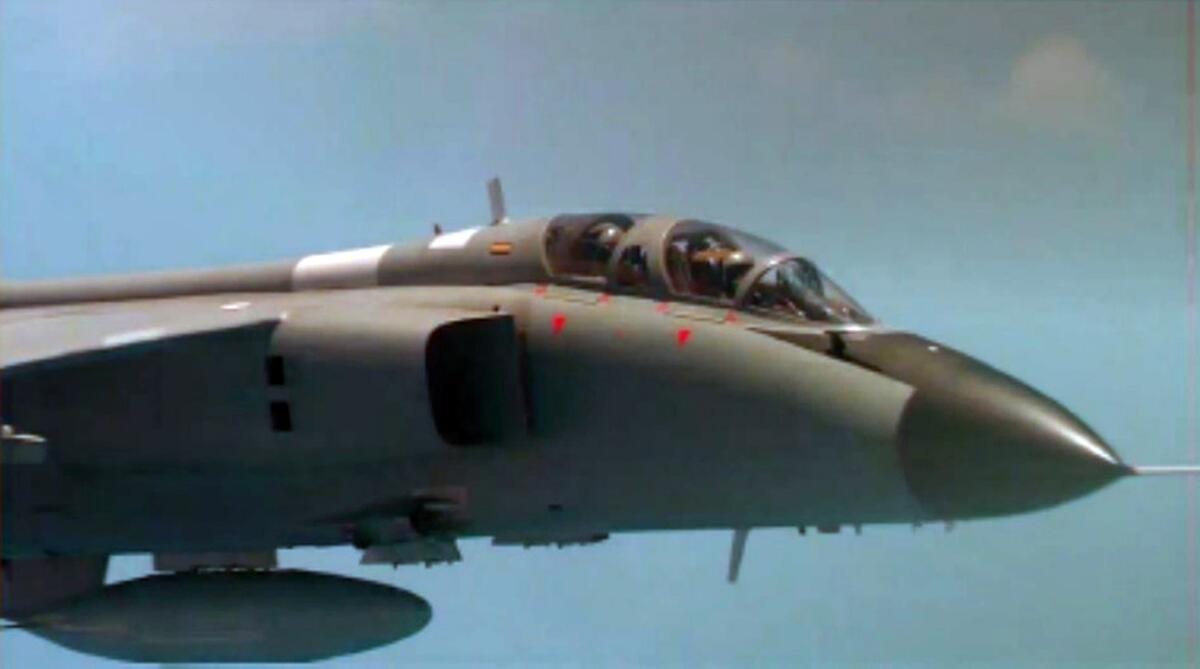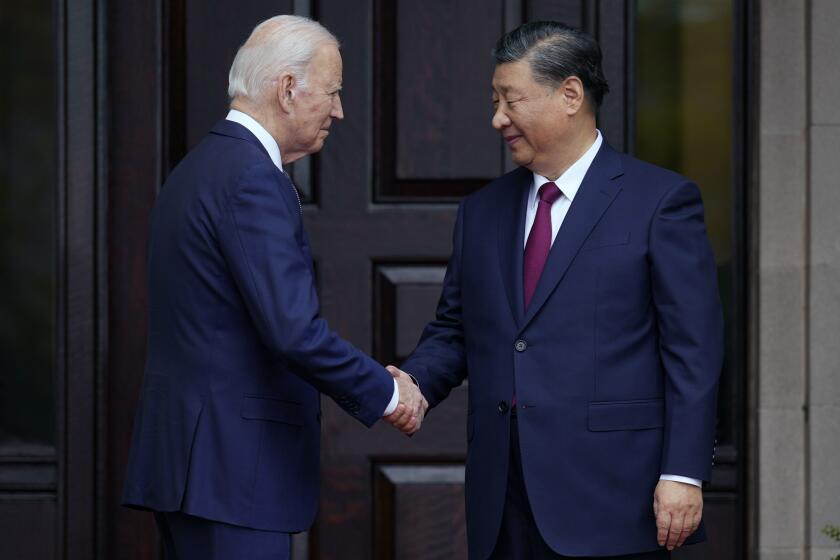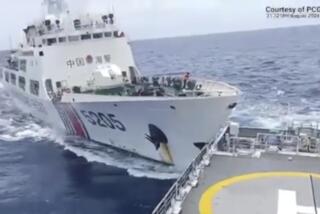U.S.-China military talks on air and maritime safety resume after a nearly 2-year break

- Share via
WASHINGTON — For the first time in nearly two years, U.S. and Chinese defense officials met this week to discuss unsafe and aggressive ship and aircraft incidents between their militaries in the Pacific region, restarting a dialogue that Beijing abruptly ended in a dispute involving Taiwan.
The meeting, held Wednesday and Thursday in Hawaii, came as Washington and Beijing work to expand communications and ease escalating tensions between the two world powers. Military-to-military contact had stalled in August 2022, when Beijing suspended all such communication after a visit by then-House Speaker Nancy Pelosi to Taiwan, the self-governing island China claims as its own.
The thaw in relations between the two countries got a kickstart last November when President Biden and China’s President Xi Jinping met on the sidelines of the Asia-Pacific Economic Cooperation summit in San Francisco. About a month later, Gen. Charles Q. Brown Jr., chairman of the U.S. Joint Chiefs of Staff, spoke with his Chinese counterpart in a video call — the first senior military-to-military contact since the Pelosi visit.
Other top-level talks have continued, including a call this week between Biden and Xi, and a visit to China by Treasury Secretary Janet Yellen that began Thursday.
The resurgence of senior military leader discussions includes the relaunch of routine engagements, including the China-U.S. Military Maritime Consultative Agreement meeting, which was this week in Hawaii, and the bilateral Defense Policy Coordination Talks, which were held earlier this year.
The maritime meeting is focused on unsafe and unprofessional incidents involving the U.S. and Chinese militaries, while the coordination talks focus on broader policy issues. This week’s meeting included representatives from the U.S. Indo-Pacific Command, the U.S. Pacific Fleet, the U.S. Pacific Air Forces and the People’s Liberation Army (PLA). This is the first time since 2019 that the meeting was held in person; there was a virtual meeting in 2021, during the COVID-19 pandemic.
The call, described by the White House as ‘candid and constructive,’ was the leaders’ first conversation since their November summit in California.
According to officials, this week’s meeting included about 18 senior military and civilian officials from each side. Both delegations noted specific incidents over the past several years that they believe raised operational safety concerns, and the group discussed them.
“Open, direct, and clear communications with the PLA — and with all other military forces in the region — is of utmost importance to avoid accidents and miscommunication,” said the head of the U.S. delegation, Army Col. Ian Francis, in a statement.
Francis, who is the director for Northeast Asia policy at U.S. Indo-Pacific Command, said the U.S. is encouraged that the People’s Liberation Army is honoring its commitments to the maritime agreement.
Two U.S. officials said that they’ve seen fewer unsafe incidents involving Chinese military aircraft and ships in recent months. They said the meeting was a way to make sure that the trend continues and that overall safety is increased in the region for troops who operate there. The officials spoke on condition of anonymity because the meetings are private.
The U.S. has consistently viewed military communications with China as critical to avoiding any missteps between their armed forces and to maintaining a peaceful Indo-Pacific.
Pelosi became the highest ranking American lawmaker to visit Taiwan since 1997, when then-Speaker Newt Gingrich traveled there. Her visit sparked a surge in military maneuvers by China. Beijing dispatched warships and aircraft across the median line in the Taiwan Strait, claiming the de facto boundary did not exist, fired missiles over Taiwan itself, and challenged established norms by firing missiles into Japan’s exclusive economic zone.
During the following two years, U.S. military officials repeatedly objected to a range of unsafe intercepts by Chinese aircraft in the Pacific and other dangerous incidents.
Last October, the Pentagon released footage of some of the more than 180 intercepts of U.S. warplanes by Chinese aircraft in the previous two years. And military officials said the number was more than the total amount over the previous decade — a trend they called concerning. In one instance last year, a Chinese pilot flew within 10 feet of a U.S. Air Force B-52, which was conducting routine operations over the South China Sea in international airspace.
China’s defense ministry, meanwhile, has criticized the U.S. for what it calls interference in both Taiwan and the South China Sea, charging that American arms sales to Taiwan are making the situation more dangerous.
Baldor writes for the Associated Press.
More to Read
Sign up for Essential California
The most important California stories and recommendations in your inbox every morning.
You may occasionally receive promotional content from the Los Angeles Times.











